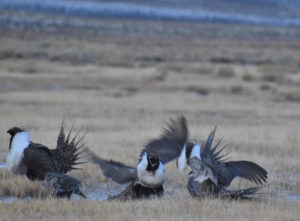FOR IMMEDIATE RELEASE:
March 13, 2018
CONTACTS:
Brooks Fahy, Predator Defense, brooks@predatordefense.org, (541) 520-6003
Erik Molvar, Western Watersheds Project, emolvar@westernwatersheds.org, (307) 399-7910
Talasi Brooks, Advocates for the West, tbrooks@advocateswest.org, (208) 342-7024
Carson Barylak, International Fund for Animal Welfare, cbarylak@ifaw.org, (614) 266-9475
Conservationists Mark Anniversary of M-44 Tragedy with Film Screening
“Cyanide bombs” remain controversial one year after killing of dog, poisoning of teen; Idaho still wants to use devices and their Congressional delegation has done nothing
POCATELLO, ID – One year after a Pocatello teen and his dog were poisoned by a government-set M-44 “cyanide bomb” just behind their home, conservation and public safety advocates are gathering with the family involved to commemorate the tragedy and call for nationwide reform.
In partnership with the family involved, these advocates will screen an award-winning documentary film, EXPOSED: USDA’s Secret War on Wildlife, in which whistleblowers reveal why the government’s war on wildlife is counter-productive and dangerous. After the film, an expert panel will take questions. They will also explain why the Pocatello case is just one of many examples of why M-44s can never be used safely, as any child, pet or wild animal is a potential victim of the device that caused Canyon Mansfield’s beloved companion Kasey to succumbed to poison right before his eyes. While Canyon escaped with his life, he has suffered terrible side effects from cyanide exposure.
“Using M-44s is equivalent to setting a landmine and walking away,” said Brooks Fahy, producer of the film and executive director of Predator Defense. “I have asked myself far too many times if it will it take a child’s death to stop this insanity. The time has come to ban cyanide bombs for good.”
Conservation and animal welfare groups responded to the Mansfield family’s tragedy by petitioning the federal agency that brought the deadly devices to Pocatello—USDA Wildlife Services—to stop using M-44s across Idaho. Wildlife Services committed to a statewide moratorium, and to inform the petitioning groups before use of M-44s resumes in Idaho. But the groups—which include Western Watersheds Project, Predator Defense and others—remain unconvinced that nominal adjustments to federal policy have made it any safer to deploy the deadly and indiscriminate “cyanide bombs” in the future.
M-44s have killed countless pets and wild animals across the country, and they have even proven deadly for humans. Dennis Slaugh of Vernal, Utah, one of the first known human M-44 victims, passed away on Feb. 24, 2018. He was placed on permanent disability after an M-44 encounter, and cyanide poisoning was listed as a contributing cause of death.
“Wildlife Services has not yet notified us to indicate they will resume using M-44s in Idaho, and if they have been listening to the public outrage, they will never use them again,” said Erik Molvar, executive director of Western Watersheds Project. “This agency could save itself a lot of public controversy and generate a lot of goodwill by halting its killing of native wildlife.”
According to heavily-redacted documents[1] recently obtained via the federal Freedom of Information Act (FOIA), the State of Idaho investigated the Pocatello M-44 incident and levied a $6,000 fine against Wildlife Services for violating state law (the Idaho Pesticides and Chemigation Act). It also revoked the professional applicator license of the relevant Wildlife Service employee(s).
“I’m pleased that the state investigated,” said Molvar. “But a $6,000 fine is a slap on the wrist in light of the seriousness of the violations that were committed.”
At the local level, law enforcement and emergency responders are seldom aware that these poisonous devices have been planted within their jurisdictions, and are generally not equipped with antidotes or training to deal with emergencies that result from M-44 deployment.
“The Pocatello Sheriff’s Department didn’t even know what the M-44 that killed the Mansfield’s dog was when it went off,” said Talasi Brooks, staff attorney with Advocates for the West. “Wildlife Services’ lethal methods have no place in the 21st century. It is fitting to be screening this film in Pocatello, where Wildlife Services manufactures M-44s at its federal Pocatello Supply Depot.”
While M-44s are not authorized for use in Idaho for the time being, they remain a threat in other states, and they could be reintroduced into Idaho at any time. A 2017 petition to end the use of M-44s in Wyoming was denied by the agency, despite the deaths of two pet dogs in the Casper area just days before the Mansfields’ devastating encounter.
“Canyon and his family have shown courage and compassion, transforming tragedy into progress by advocating for policy reform to protect other families and pets—it’s time for our leaders in Washington to follow their lead and enact Canyon’s Law (H.R. 1818),” said Carson Barylak, campaigns officer at the International Fund for Animal Welfare.
“So many people use our public lands for hiking, biking, woodcutting, hunting, fishing and livestock grazing,” said Carter Niemeyer, a former district supervisor with Wildlife Services in Montana. “Would you feel comfortable knowing that M-44 sodium cyanide devices set to kill coyotes were located where your pets or working dogs might be instantly killed? As a society we can protect livestock in better and safer ways.”
“This is a rally which will gather local Pocatello and Bannock County residents to discuss where we are, to commemorate the anniversary of this tragic event, and to discuss where we are going,” said Dr. Mark Mansfield, father of Canyon Mansfield and owner of Kasey. “We need our community to come together and denounce the production of cyanide bombs in our city and the placement of these archaic and indiscriminate devices on our lands.”
The film screening and discussion will take place at 7 p.m. on Thursday, March 15, at Idaho State University’s Bengal Theater in Pocatello.
###





